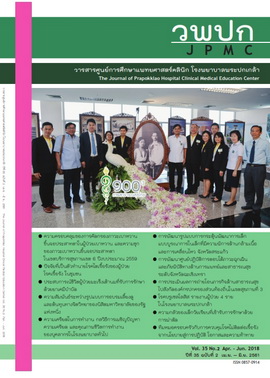Factors Predicting Chronic Kidney Disease of Patients with Chronic Disease in the Community.
Main Article Content
Abstract
Background: The goal is preventing or delaying the deterioration of the kidney disease into severe chronic kidney failure. This requires a long treatment period. This study will be very useful in planning for the care of patients with chronic kidney disease, with the ultimate goal of preventing peritoneal dialysis.
Objective: The research goal was to study the predictors of chronic kidney disease, looking at patients with chronic diseases in the community.
Materials and methods: This is a descriptive study; the sample consisted of 205 chronic disease patients with chronic kidney disease (CKD) in community Lam Luk Ka District. Data were collected through an interview. Data were analyzed using a statistics approach of frequency, percentage, mean and standard deviations. The statistics revealed the relationship factors of CKD, and the factors that would predict CKD for patients with disease, by stepwise multiple regression analysis.
Results: The coefficient of prediction (R2) is 0.459. All six variables (factors) could significantly predict chronic kidney disease in patients within the community, at the statically significant level of 0.05 (45.90%).
Conclusion: Providing self-care advice to patients in self-care, and the behaviors of these patients, in order to slow or halt the progression of the diseases, as well as the prevention of other serious conditions, all of which will affect the quality of life of patients, both physically and mentally.
Article Details
References
2. Promdee O, Taengtum W, Pichayapinyo P. Chronic kidney disease preventing program among uncontrolled diabetic patients. Journal of Public Health Nursing 2016; 30:102-17.
3. Thungtong S, Chinnawong T, Thaniwattananon P. Effects of self-management support program for delayed progression of diabetic nephropathy on self-management behaviors and clinical outcomes in patients with uncontrolled type 2 diabetes mellitus. Songklanagarind Journal of Nursing 2015; 35(1):67-84.
4. Tanakidjaru P. Current situation of chronic kidney disease in Thailand. Journal of the Department of Medical Services 2015;40: 5-18.
5. Whittier WL, Lewis EJ. Pathophysiology of chronic kidney disease. In: Gilbert SJ, Weiner DE, editors. National Kidney Foundation Primer on Kidney Diseases. 6th ed. Philadelphia: Elsevier/Saunders; 2014. p 448-57.
6. Pender, N.J. Health Promotion in Nursing Practice. 2nd ed. New York: Appleton & Lange; 1978.
7. Unaphak P, Rattanamanee K. The correlation factors of self-care behaviors to prevent complications among patients with chronic kidney disease at Somdetphraphutthalertla Hospital in Samutsongkhram province. The Public Health Journal of Burapha University 2015; 10(2): 44-54.
8. Lamlukka Hospital. Data chronic patient of Pathumthani province. Pathumthani: Lamlukka Hospital; 2015.
9. Krejcie RV, Morgan DW. Determining Sample Size for Research Activities. Educ Psychol Meas 1970;30:607-10.
10. Prapipanid V. Nursing research nursing informatics and statistics. Nonthaburi: Sukhothai Thammathirat University; 2013.
11. Skulpunyawat S. Health promotion behaviors of muslim elders in case of Okarak district Nakornnayork province. Journal of The Royal Thai Army Nurses 2014; 15(3): 353-60.
12. Chuemongkon W, Sukyoo P, Kruetiwa N. The effects of medication counseling on drug compliance in peritoneal dialysis patients at peritoneal dialysis clinic in Nopparat Rajathanee Hospital, Bangkok. IJPS 2014; 10:339-53.
13. Leetaweesuk J, Makee P, Charachan P, Yana P, Jindawattanawong P, Thiratanyaboon L, Rattanapanich N, Thanitkunsarn O. Drug use behaviors of elderly patients with chronic disease in Chiang-Tong community Rahang sub-district, muang-Tak district, Tak province. Phitsanulok: Faculty of Medicine Naresuan University; 2017.
14. Direksri S, Chanthapasa K. Explanatory model of chronic kidney disease in perspective of patient. The 4th Annual Northeast Pharmacy Research Conference of 2012 “Pharmacy Profession in Harmony”, 2012 Feb 11-12; Khon Kaen: Faculty of Pharmaceutical Sciences, Khon Kaen University; 2012; 72-6.
15. Busapavanich S, Dandacha P. Behavioral not appropriate chronic kidney disease. Songkla Med J 2006; 24:281-7.
16. Ministry of Public Health. Non-Communicable Diseases: Nonthaburi: Bureau of Non-Communicable Disease; 2012.
17. Jirubapa M. The slowly progressive chronic kidney disease from adult to elder persons. The Journal of Boromarajonani College of Nursing, Nakhonratchasima 2014; 20(2): 5-16.
18. Sara K, Suriyakrai S, Toomnan J. Prevalence and factors associated with chronic kidney disease stages 3-5 in Trakan Phuet Phon Hospital, Ubon Ratchathani. The National and International Graduate Research Conference 2016 Mar 28. Khon Kaen: Khon Kaen University; 2016. P.887-94.
19. Ongsuriyanondh S. Self-care behavior development among chronic renal disease patients, Chaoprayayomraj Hospital, Suphanburi province. Journal of Public Health and Development 2008; 6:32-8.
20. Seephom S. Self-management in chronic kidney disease. Thai Red Cross Nursing Journal 2013; 6:12-8.
21. Klanbut S, Maneechote L, Loedchaiyapan W, Chuemongkon W. Effect of counseling in chronic kidney disease patients at outpatient clinic of Phraphutthabat Hospital, Saraburi Province. Dialogue Pharm Health Care Pract. 2014; 1:20-6.
22. Chantarameteekul S. Risk factors for peritonitis in chronic peritonitis. Mahasarakham Hospital Journal. 2011; 7:76-86.
23. Bunyatnopparat K, Anutrakulchai S. Factors associated with life quality of hemodialysis patients. Srinagarind Med J 2017; 32:2-9.

